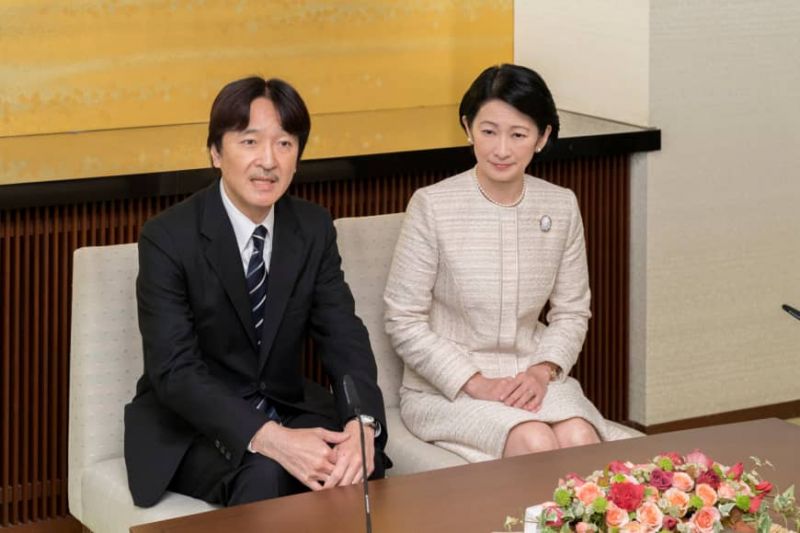The article below from the Japan Times caught my attention for two reasons. First of all, I was puzzled by the motives of Prince Akishino, brother of the next emperor, because I had always found him more conservative than the rest of his family and therefore more inclined to support state support of Shinto. A second reason for interest was because very soon next year we are going to be seeing a lot of discussion about the abdication of the present emperor and the rites concerning the new emperor. Judging by Akishino’s outburst, things could get interesting.
“”””””””””””””
Prince’s right to free speech a hot topic in Japan

Prince’s right to free speech a hot topic in Japan Prince Akishino and his wife, Princess Kiko, attend a news conference ahead of his 53rd birthday at the their residence in Tokyo on Nov. 22. | REUTERS
A remark by Prince Akishino, who will become first in line to the throne next year, has stirred controversy over how freely members of the Imperial family can speak about contentious matters because the Constitution prohibits the head of the family from being involved in politics.
In a rare move for a royal, Prince Akishino, second son of the outgoing Emperor Akihito, questioned the government’s decision to use a massive amount of public money for a Shinto-related ritual to take place in November next year as part of the ascension of Crown Prince Naruhito.
“I wonder whether it is appropriate to cover the highly religious event with state funds,” the prince said during a recent news conference for his 53rd birthday, baffling senior bureaucrats of the Imperial Household Agency as well as many experts on royal family matters.
Major Japanese media outlets covered his comments extensively Friday morning, prompting many in Japan to revisit not only the principle of the separation of state and religion, but the issue of how freely members of the Imperial family can speak in public.
The Emperor and his family members have generally refrained from making political remarks as the Constitution, compiled after Japan’s surrender in World War II, stipulates the emperor “shall not have powers related to government.”
The prince has “crossed the line,” an official of the agency said. Another criticized the prince’s remark, saying, “It is hard to understand why (the prince) stuck his nose into the matter of the Crown Prince, who will engage in the rite.”
Emperor Akihito, his first son Crown Prince Naruhito and Prince Akishino typically give news conferences ahead of their birthdays.
But only Prince Akishino speaks to reporters without prepared text on hand as a matter of practice, which means his aides and other agency bureaucrats have few opportunities to know in advance what he will say in public.
It was not the first time that remarks made by Prince Akishino have led to various disputes.
In 2004 Crown Prince Naruhito questioned the treatment of his ailing wife Masako, saying, “There were developments that were regarded as denying her a career and going against her personality.”
After the remark made headlines and worried the Emperor, Prince Akishino challenged his elder brother, telling reporters that the Crown Prince should have made the remark through consultation with their father in advance. A number of media outlets, including foreign media, highlighted the apparent Imperial family split.
Prince Akishino also proposed Japan discuss setting a retirement age for the Emperor at his 2011 birthday news conference, years before the country authorized the abdication. The Emperor will turn 85 on Dec. 23.
An official involved in the agency said, “It seems that the prince believes it is a good thing that people know there are differences in the Imperial family.”
“It should not be a problem in light of the Constitution if a member of the Imperial family makes such a remark,” said Koichi Yokota, an expert on the top law who serves as professor emeritus at Kyushu University.
“The Constitution bans the emperor from involvement in government but does not mention royal family members apart from the emperor,” Yokota said in support of Prince Akishino’s right to free speech.
Isao Tokoro, another constitutional expert who serves as professor emeritus at Kyoto Sangyo University, urged Prince Akishino to be more careful about his remarks.
“I would like him to recognize the weight of the position he will take six months later, and use caution when making remarks, such as by consulting with people around him,” Tokoro said.
Nonfiction writer Masayasu Hosaka, who has written many books on modern Japanese history, said, “I regarded the prince’s remark as a strong message from the Imperial family that they want people to think seriously about the principle of separation of state and religion.”

Leave a Reply